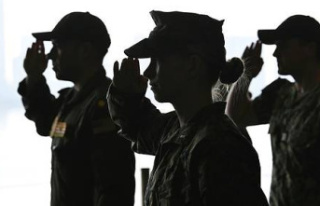What would be the secret to a successful streak? Take The Wire, created by American David Simon and considered one of the best series of all time. The ingredients of its success? Its realism, its almost literary breath (David Simon often quotes Balzac to talk about his universe and his characters), his characters mired in their destinies in the slums of Baltimore, a reinvented, dissected city, traversed by urban myths.
The main ingredient remains its realism and, all things considered, we find this striking aspect in the series of Ramadan in Algeria which is a hit, while creating controversy, El Dama.
Broadcast by public television (ENTV) and achieving record ratings, El Dama plunges into the daily life (notably at night) of the emblematic working-class district of Algiers, Bab El Oued. “We are no longer in the quiet drama [series] of Ramadan that takes place in luxurious villas with extended family intrigues,” argues a critic on social networks.
Here, Bab El Oued, its streets and its nights vibrate to the rhythms of conflicts between gangs, drug trafficking or gold smuggling networks. The series espouses this frenetic rhythm, mobilizing stunts and chases, fights and settling scores covered by the darkness of the Algiers alleys not far from the port. All carried by "mouths" of actresses and actors inhabited by tension, challenges, the will to survive.
Events and dialogues are carried by a scenario which, finally, speaks as in the Algiers reality. Appreciable thing in an audiovisual environment padlocked by the doxa of "well spoken" and concerned, under the gaze of censorship, to remain in the nails of good morals and family values, religion, "national constants", etc.
The academic Habiba Laloui salutes the work of appropriation of the language of Bab El Oued and the Kasbah by the young scriptwriter, Sara Berretima, and she underlines the coup de force of having worked on the language of violence and the street to extract dialogues in the service of effective screenwriting. "There is a rhetoric that attracts viewers eager to listen to their own language on public television which remains monopolized by the language of wood, a language calcified for ages", underlines the academic on a Facebook post. Moreover, she adds, "we must not forget that representing the language of the street, always marked by masculinity, is not an easy task for a writer, because penetrating this language will require a double effort... ".
The duo between the young screenwriter and the director Yahia Mouzahem seems to work perfectly to breathe a good dose of reality into the series, far from the plan-plan stereotypes of certain Ramadan series which target a large and "family" audience during Ramadan prime time. The acting of the actors – including the leading roles and the very inhabitants of the district, as well as the child actors – should be highlighted, which was hailed by an increasingly won over audience.
This realism and the subjects covered, in particular the phenomenon of drugs in schools, did not fail to make the most conservative react. For example, this MP who told the media that the series "encourages the proliferation of narcotics in schools because it shows that it is a quick and effective way to earn money". The same elected official insists that "audiovisual productions must have a role in raising awareness in society". "They must deal with social ills with responsibility, presenting solutions and through a well-chosen language of dialogue that respects the [cultural and moral] references of Algerians", continues the deputy.
"Viewers have the right to discuss and argue about a work," reacted director Yahia Mouzahem, while considering that some "criticisms mean absolutely nothing since a series is not a moral lesson" .
As for the language of the series, the director claimed that it was "our everyday language that we speak in our popular neighborhoods".
"We are not going to ask a director to solve the problems of drugs or violence in our cities, a series or a film only reflects reality, and what this series shows is reality", defends a user on social networks.
Debates and discussions quietly enlivened social networks and the media around the series, until the audiovisual policeman, the Audiovisual Regulatory Authority (ARAV), intervened with a bang, creating a new twist.
On Thursday, March 30, the ARAV indicated that it had "recorded, while viewing a public television program, in this case the soap opera El Dama, in its first episode, at the 19th minute 45 seconds, a scene showing a wall at the level of a market in Bab El Oued on which is written the name of a separatist movement classified as terrorist".
It would be, according to the media, the inscription "MAK" tagged on a wall in the Algiers district. As a reminder, the MAK (Movement for the autonomy of Kabylie) was classified, with Rachad (an organization of opponents in exile formed in particular by former executives of the Islamic Salvation Front, FIS, dissolved in 1992), as an "organization terrorist” in May 2021.
The ARAV even claimed to have "seized the public television to request clarifications on this subject and will take the necessary measures in the light of the clarifications provided by the EPTV [the public television]".
Public television, two days later, replied, but in confusion: "The appearance of these writings during the broadcast of the soap opera was due to a lack of concentration both during the filming and during the editing and viewing of the episodes. . While continuing "that there is a certain ambiguity in the reading of these initials which, according to the inhabitants of the district, are not the symbols of the separatist movement".
In the end, it is director Mouzahem who decides: he films local residents who explain that the inscription is in fact an "MRK" in reference, ironically, to a... Turkish series!
As a result, everyone calms down and the soap opera continues its merry way on the screens, continuing to beat audience records, especially for state television lacking the support of the majority of viewers.
But the episode leaves one wondering about the mechanisms of "control" of the Algerian audiovisual sector. The Minister of Communication, challenged by parliamentarians "shocked" by the El Dama series, announced that a "cell" has been set up within his department to "monitor the quality of Ramadan programs" in order to strengthen ARAV's missions. No details on the composition or legal prerogatives of this "commission" are provided at this time.
These developments come at a time when film and audiovisual professionals in general are concerned about the provisions of the film bill which will soon be adopted – pending the completion of consultations with players in the sector. Professionals fear that limitations and other red lines regarding "values", religion, official history of the Revolutionary War, "higher interests of the nation", "national constants", "symbols of 'State', historical or public figures, etc. do not encroach on the freedom of creation.












